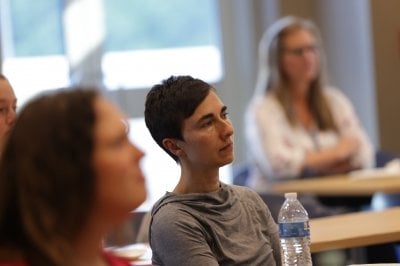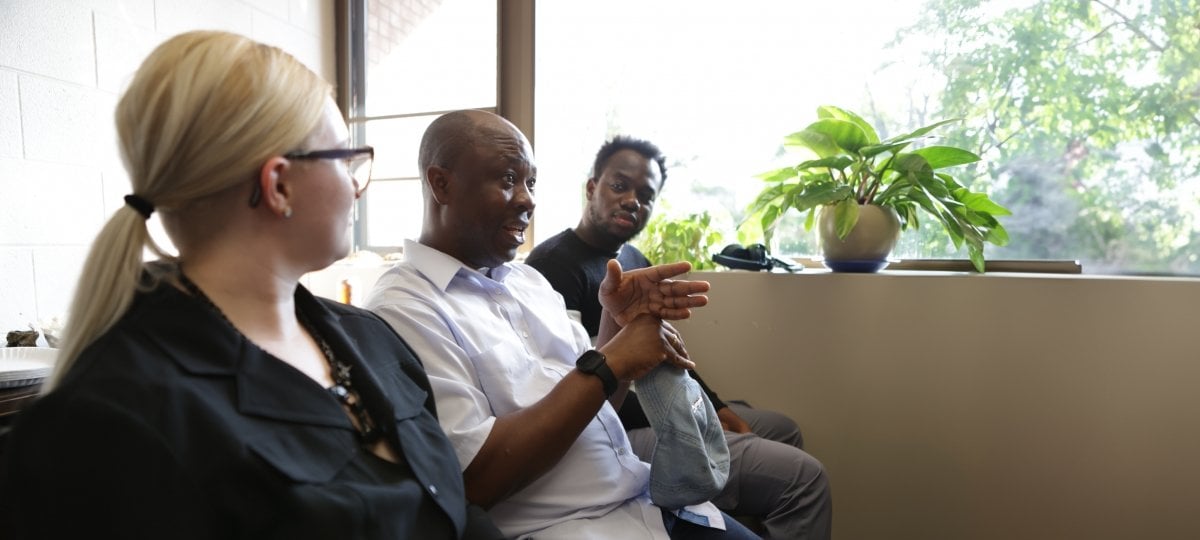The Humanities department at Michigan Technological University offers a broad interdisciplinary program of graduate education through its program in Rhetoric, Theory, and Culture. Our faculty and the courses they teach engage a variety of fields and address topics, which include AI; algorithmic culture; communication and human machine communication; composition and writing pedagogy; cultural studies; environmental humanities, feminism and gender studies; film studies; literature and creative writing; media and digital media studies; philosophy and ethics; rhetoric; social justice and social informatics; and visual studies.
Our program and faculty help educate future scholars, teachers, writers, and provides pathways to other professions, including work in the for-profit and non-profit sectors.
Admissions Information
Program recruitment focuses primarily on fall semester admissions. The deadline for fall applications is January 15th. To be considered for admission and financial support, applications must be submitted and complete by this date. Financial support is limited and awarded on availability. If you have questions about the admissions process, please contact the Director of Graduate Studies.
Applying to the RTC Program
Prospective students should apply online at the Graduate School.
Applications are not complete until the following items are received. These documents need to be uploaded to the Michigan Tech Application Portal.
- MTU Graduate School Application
- Statement of Purpose: This document should articulate your research interests and the faculty in the RTC program with whom you would like to work. Awareness of our program’s faculty and their scholarship is important. Begin your statement by identifying where you are now and offer a vision of your imagined trajectory as a graduate student. Please make clear why you want to pursue a degree in the RTC program. You should address the relationship between your writing sample and your research area(s). Please identify scholars outside our program that you admire and the theoretical texts and methodologies that have engaged to date and/or that you plan to study. Please also trace your accomplishments as a scholar: essays you have written, courses you have taught, any publications and conference presentations.
- Personal Statement: Briefly discuss your unique qualifications, skills, and/or relevant experience related to your interest(s) in graduate study.;
- Writing Sample: Please limit submissions to 15-30 pages, including footnotes and works cited. The essay should be a double-spaced single essay. The writing sample should demonstrate your intellectual interests and show an awareness of existing scholarship in your field.
- Three (3) letters of Recommendation: Please give your recommenders at least one month’s notice before your application deadline. Ideally, these letters should reflect on your research interests and scholarship. If you have teaching experience, we welcome any comments on your teaching. Ideally, letters should come from current and former faculty with whom you have studied.
- Curriculum Vitae (CV/Resume)
- If English is not your native language, your official TOEFL scores. This link provides a more detailed explanation from the Graduate School.
- If applicable, GRE scores.
Program Options

Ph.D. in Rhetoric, Theory, and Culture
Learn more about our Ph.D. program.
To complete a doctoral degree, students must complete the following milestones:
- Complete all coursework and research credits (see credit requirements below)
- Pass Qualifying Examination
- Pass Research Proposal Examination
- Prepare and Submit Approved Dissertation
- Pass Final Oral Defense
The minimum credit requirements are as follows:
| Degrees | Credits |
|---|---|
| MS-PhD (minimum) | 30 Credits |
| BS-PhD (minimum) | 60 Credits |
Individual programs may have higher standards and students are expected to know their program's requirements. See the Doctor of Philosophy Requirements website for more information about PhD milestones and related timelines.

M.S. in Rhetoric, Theory, and Culture
Learn more about our Master's program.
Availability of Financial Support
The Rhetoric, Theory, and Culture program endeavors to support all students needing financial assistance. Doctoral students have priority over Master's students because of the longer time commitment involved. Decisions on financial support and contract offers for the upcoming academic year are made in spring semester, after applications to the program have been reviewed and acceptances determined.
The primary source of funding available for RTC graduate students is payment for teaching. Students serve primarily as Graduate Teaching Instructors (GTIs) and are instructors of record in the courses they teach. The load is three courses per year (one fall course and two spring courses the first year, two fall courses and one spring course thereafter). GTIs typically teach Composition and Technical Communication—though qualified graduate students may occasionally be offered teaching opportunities in other disciplines, as well as administrative support positions or research assistantships.
